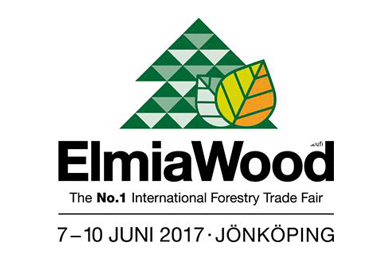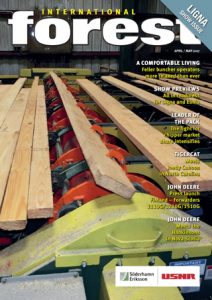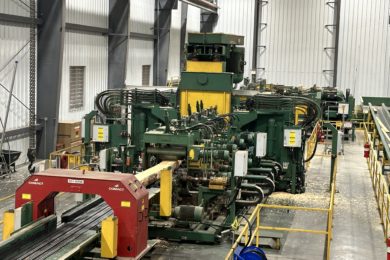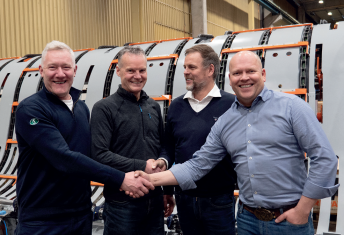Forestry is one of the most important industries in Brazil and trees there have a very high growth rate. But a changing climate including drought can lead to the reduced growth of such species as cultivated eucalyptus and pine.
“Brazil needs the latest expertise and technologies and they’re presented at Elmia Wood,” says Jorge R. Malinovski, General Director of the forestry consulting firm of Malinovski in Brazil.
The firm organises South America’s leading forestry fair, Expoforest, in Brazil. But it is to Sweden that Brazilians come to find the very latest developments. Jorge Malinovski will be attending the next international forestry fair, Elmia Wood 2017, with some 40 decision-makers from some of the country’s major forestry companies.
“They’re looking for technical innovations and international partnerships,” he says.
Very high growth
Much of Brazilian tree cultivation is done on plantations, with the biggest increases occurring in the southeast of the country. The most common tree species are eucalyptus and pine.
Other cultivated species are Paricá, Teca, Mogno Africano, Seringueira and Australian cedar. Tree growth is very high from the perspective of traditional forestry nations. On one hectare of eucalyptus, growth is about 50 cubic metres per year, with final felling after 7 years for pulp wood and 16 years for sawn timber. Although it is not possible to make a totally fair comparison, trees on Brazilian plantations grow four to five times faster than conifers in the northern hemisphere.
Good conditions for forestry are the foundation for major investments, mainly in the production of paper pulp. From 2011 to 2019 capacity will more than double, from 14 to 30 million tonnes per year.
Climate change is causing drought
At the same time, ongoing climate change is causing drought in parts of Brazil, mainly in the west and northeast regions. The result can be less growth and lower felling productivity.
Brazil’s forestry industry is aiming to balance this situation with the aid of the latest knowledge and technologies. That’s why a delegation from the country’s bigger forest companies is coming to Sweden and Elmia Wood 2017.
“It’s at Elmia Wood that manufacturers launch their new harvesting machinery and other forestry equipment. It’s a trade fair that all forestry professionals need to attend,” says Jorge Malinovski.
Contact persons
Jakob Hirsmark, Exhibition Manager, +46 36 15 22 14, jakob.hirsmark@elmia.se
Sara Åberg, Communicator, +46 36 15 20 49, sara.aberg@elmia.se
Rafael Malinovski, Elmia Wood representative for Brazil, +55 41 3049 7888, comunicacao@malinovski.com.br
Coming up in the June/July 2017 edition of IFI
ELMIA WOOD EDITION & PRODUCTS EXPO 2017 – BOOK EARLY!
LOGGING & BIOMASS
Forwarders: The improved power and capacity of the forwarder has revolutionised the possibilities for cut-to-length harvesting operations. IFI tracks suppliers as they continue down that path.
Winch Assisted Logging: Mechanised timber harvesting on steep slopes – world wide report.
Trucks and Trailers: Cutting down the timber and processing the lumber are the primary forest industries but the link in between is crucial for their smooth running. Wood transport uses the world’s foremost truck manufacturers and speciality wood trailer and IFI reviews which ones are doing the best job.
Operation Focus – JOHN DEERE: The Beaujolais region doesn’t only produce wine. A huge number of resinous trees, predominantly conifer and often mature Douglas, cover the landscape.
Operation Focus – TIGERCAT: TBC
LUMBER PROCESSING
SAWLINES: The complete sawline sits at the heart of the sawmill and provides a home for a multitude of technologies that combine to make sure that heart beats consistently and rhythmically. IFI speaks to companies delivering complete sawlines into businesses across the world to see who is drumming up the most business and what the market is demanding.
Mobile Sawmills: Round up of major manufacturers.
Wood Drying Technology: From double-track, single-track and side-loading configurations, the sawmill’s work isn’t done until the icing is put on the cake. For the lumber processing industry, icing the cake involved drying and finishing the sawn-wood products properly, dressing them up for market. The feature will look at not only the latest in kiln technology and the issues facing kiln manufacturers, but the supporting components that keep modern kilns at the cutting edge, such as moisture measurement systems, kiln humidification systems, and thermal modification and vacuum drying.
ENGINEERED WOOD PRODUCTS
WOOD BASED PANELS: IFI now covers all the latest news from around the world relying on a defined database of professionals in the panel manufacturing industries. Manufacturers are currently supplying us with in depth reports on their latest technologies and new installations.
Special Features: PB Plants & Technologies
Click HERE to read the latest edition of IFI April/May 2017








